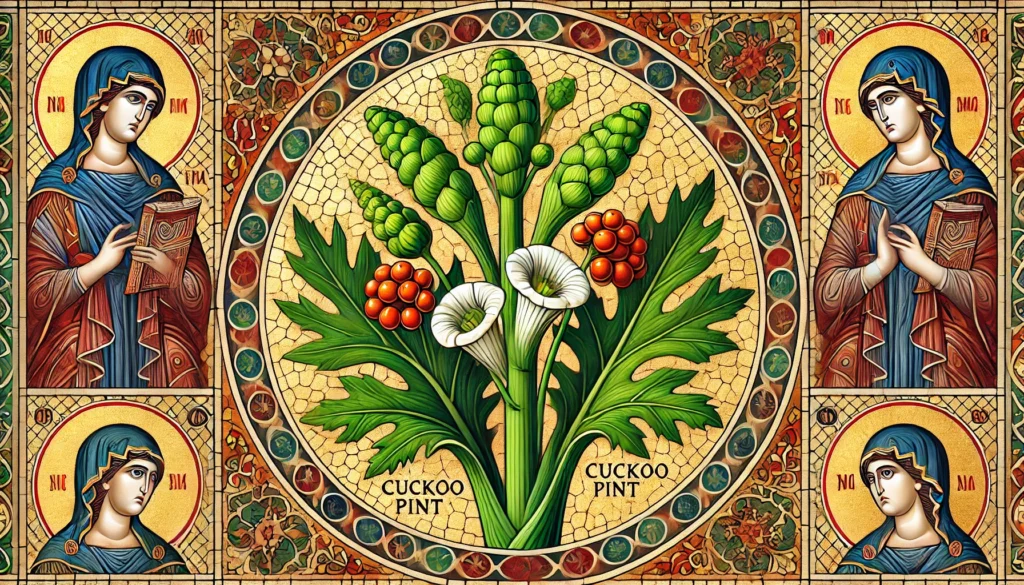

Home » Cat Plants » How Dangerous is the Cuckoo Pint Plant for Cats?

Cuckoo Pint (Arum maculatum), also known as lords-and-ladies, is a poisonous woodland flowering plant native to Europe. All parts of this plant are toxic to cats due to the presence of insoluble calcium oxalate crystals and possibly proteinase enzymes, depending on the species.
Cuckoo-pint is commonly found in woodland areas, along riversides, and is sometimes cultivated as an ornamental plant in gardens.
Ingestion may cause mild gastrointestinal upset, but is generally not life-threatening.
Ingestion can result in mild symptoms like vomiting, diarrhea, or drooling. Rarely fatal but may require veterinary care.
Eating these plants can lead to more pronounced symptoms like abdominal pain, lethargy, or difficulty breathing. Veterinary intervention may be necessary.
Ingesting even small amounts can cause severe symptoms like organ damage, seizures, or cardiac failure without rapid treatment.
All parts of these plants are extremely poisonous to cats and can quickly lead to death, even with immediate veterinary care.
** Please note: Please note that toxicity level can vary based on the amount ingested and the specific cat. It's always best to keep these plants completely inaccessible to cats and seek immediate veterinary care or call the poison hotline if you suspect your cat has ingested any part of a toxic plant.
If a cat ingests any part of the cuckoo-pint plant, it may experience a range of toxic symptoms. These can include an intense burning sensation in the mouth, throat, lips, and tongue, excessive drooling, choking, swelling of the throat, and difficulty swallowing. In more severe cases, the cat may exhibit vomiting, diarrhea, gastrointestinal distress, difficulty breathing due to throat swelling, head shaking, and gagging. Symptoms can appear immediately or within two hours of ingestion and may persist for up to two weeks.
If you suspect your cat has ingested cuckoo-pint, it is crucial to seek veterinary care immediately. Your veterinarian will likely perform the following steps to diagnose cuckoo-pint poisoning:
In areas where cuckoo-pint grows naturally, it is a commonly seen plant poisoning, making diagnosis more straightforward.

A: Yes, cats can be allergic to Cuckoo Pint. Symptoms of an allergic reaction may include itching, sneezing, and skin irritation.
A: Yes, Cuckoo Pint, also known as Arum maculatum or Lords and Ladies, is highly toxic to cats. Ingesting any part of this plant can cause severe symptoms and can be fatal if not treated promptly.
A: Symptoms of Cuckoo Pint poisoning in cats include vomiting, diarrhea, drooling, difficulty swallowing, and swelling of the mouth and throat. Immediate veterinary care is crucial if ingestion is suspected.
A: To prevent contact, ensure that Cuckoo Pint is not present in your home or garden. Keep your cat indoors or monitor outdoor activities closely to avoid exposure.
A: If your cat ingests Cuckoo Pint, contact your veterinarian immediately. Do not induce vomiting unless instructed by a veterinary professional. Immediate medical attention is necessary.
A: Cuckoo Pint is more commonly found in wild areas and woodlands rather than home gardens. However, if you do have this plant in your vicinity, it is important to ensure it is kept out of reach of cats to prevent accidental ingestion.
Cuckoo-pint has a long history of use in folklore and traditional medicine. Its common names, such as “lords-and-ladies” and “devils-and-angels,” often allude to the plant’s resemblance to male and female genitalia.
In the past, the plant’s root was used to make laundry starch, particularly during the Elizabethan era, to stiffen ruffs worn around the necks of the gentry. However, this practice was discontinued due to the corrosive properties of the plant’s juice, which caused painful effects for the laundresses.
Please note: The information shared in this post is for informational purposes only and should not be considered as veterinary medical advice.
🐾 A hilarious or heart-melting cat video
🐾 Our latest paws-on review of a cool cat toy